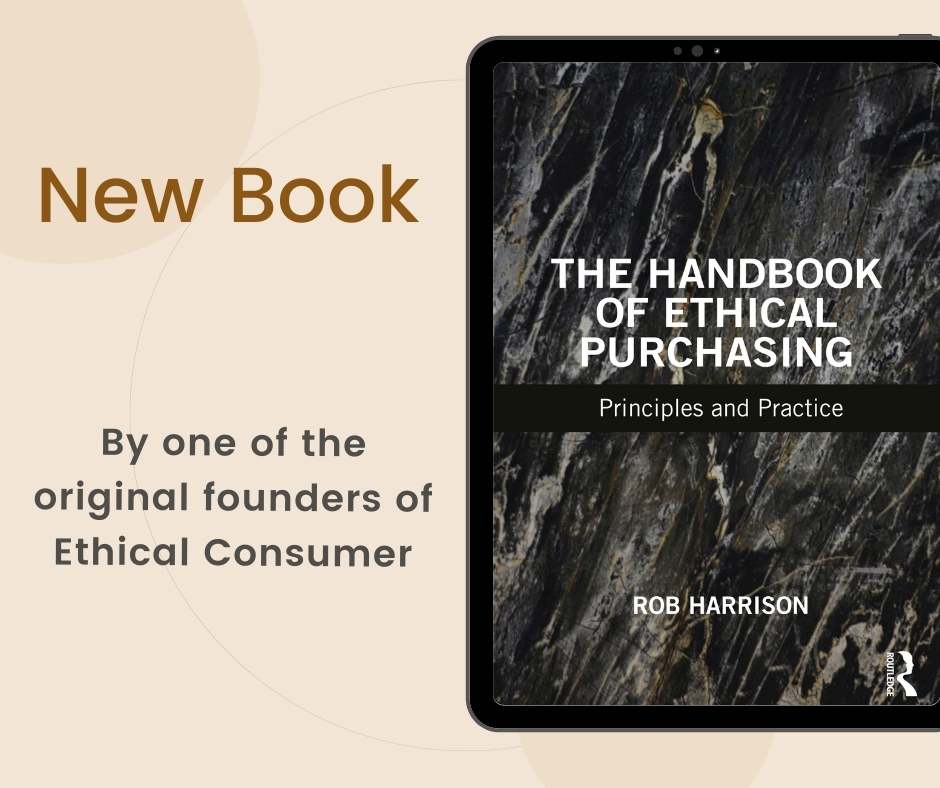In this second extract from the Handbook of Ethical Purchasing, Rob Harrison introduces the five types of ethical purchasing we tend to see in local governments around the world.
January 2022

January 2022
Buying ethically is not something that just individuals do. We can also see it happening in clubs, societies, businesses, charities, local authorities and governments.
This article sets out the five main types of ethical purchasing by local authorities.
Solidarity purchasing occurs where regional authorities choose to support a political cause outside their jurisdiction. The classic case occurred during the global boycott of South Africa over its openly racist apartheid policies. By the mid-1960s, 54 UK councils were banning goods from South Africa from their offices and schools and, in the USA by the end of 1989, 26 states, 22 counties and over 90 cities had also taken some form of binding economic action. More recent campaigns against other ‘oppressive regimes’ in Burma and Israel have also sought, and often won, local authority support.
The politicised nature of these campaigns has led many governments, who are often controlled by opposing political parties, to try to restrict local authorities from using their purchasing power in this way.
Some studies of local economies suggest that ethical public purchasing can have a significant impact. For example, in 2005, the UK non-government organisation (NGO) New Economics Foundation published research in collaboration with Northumberland council which showed that suppliers based in Northumberland re-spent on average 76% of their income locally, while suppliers from outside the county spent only 36% in the area.
Preston City Council in the UK is well known for having devised such a programme and for involving other public sector purchasers, including the hospital and university. In 2013, before the programme began, the six local public bodies spent £38 million in Preston and £292 million in all of Lancashire. By 2017, those totals stood at £111 million in Preston and £486 million throughout the county.
Environmentally conscious buying by local authorities, commonly referred to as sustainable procurement, is one of the most widely practised forms of ethical purchasing. A survey in 2010 looked at 280 authorities from 20 countries and found some kinds of sustainable procurement occurring in the majority of them.
However, deciding what is ‘sustainable’ and what is not is difficult and interpreted in a wide variety of ways, and some local authority programmes are clearly very weak.
The idea that social enterprise could become an important systemic solution to some of the problems created by the behaviour of profit-seeking corporations has been gathering pace. In the 1990s, Italian laws were introduced which recognised this and allowed some local authority buyers to prefer co-operatives in public purchasing.
Although this was subsequently blocked by EU rules until 2014, buyers in Europe can now reserve some contracts for enterprises employing people with disabilities or other disadvantages, or which are addressing other social, health, or cultural needs.
It is common for public pension funds or other public authority assets to include shareholdings in mainstream companies. Campaigns for more ethical corporate behaviour will commonly ask local authorities to consider divestment.
Public authority divestment became a central plank of the Anti-Apartheid campaign and, more recently, the campaign to divest from fossil fuel companies has taken a similar approach. The website gofossilfree.org listed 149 government institutions as having taken some form of divestment action in 2018, including cities in Australia, Germany, Sweden, France, Ireland, the UK, and the USA.
It is estimated that public sector purchasing represents between 11% and 18% of the UK’s gross domestic product and is similar in other countries.
The chapter in the book goes on to provide some key suggestions for local authorities to help increase the social impacts of their purchasing and investment. In some cases, there is genuine excitement around the potential improvements to people’s lives that may be possible if this kind of ethical purchasing were more widely adopted.

The Handbook of Ethical Purchasing, which contains references and more information on the extract above, is published by Routledge and is available directly from the publisher for £29.99.